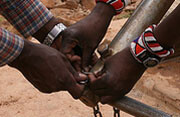Water, our most basic need, is poised to be the most baffling challenge of the 21st century. It is being ignored wantonly at a time when more than 1 million people per year die from its scarcity and contamination. Children under age five account for at least 90 percent of water-related deaths. Meanwhile, economic productivity and educational opportunities are lost to illness, leaving millions more in an impoverished state even if they do survive their first five years of life.
Access to water is a human right. Yet that statement makes many people uncomfortable. Most in the developed world can hardly imagine water being anything more than a nominal expense that is easily drawn from a faucet. They think, "Surely it is a commodity to be bought and sold. It hardly costs anything, and it is even reusable, so what's the big deal?"
The big deal is that 1.1 billion people lack access to clean water at all. Most of those people live in Africa and Asia. But if you ask them whether water is a human right, they will laugh the notion off, with appreciation for your kind naïveté. But they will not discount water's importance. They will tell you that they walk up to 2 hours per day to fetch water that is often found in muddy puddles from rain runoff during the few brief months when rain does fall. This kind of water is rife with disease-causing organisms, which they drink unquestioningly.
The areas in which these grateful people live are suffering from soil erosion, decreasing tree coverage, and increasing malaria rates. The environment is deteriorating, and sanitation is simply horrific. Without adequate water for drinking and cooking, hygiene is sacrificed as well. They are forced to eat without washing their hands.
Poor hygiene, in its unrelenting ways, cycles back into the water sources. When people lack decent latrines and sanitation resources, fecal matter and other biohazards circulate back into the muddy puddles from which the people draw their daily water. Even more prevalent are water sources damaged by animal waste.
Given these remarkable challenges, what can be done to meet the global demand for clean water?
A lot can be done. First, it should be noted that there is no one-size-fits-all solution. Given its vital nature, water cannot be treated as a commodity alone. Research suggests that water, when commoditized in poor countries, costs more to the rural poor than it does to the urban wealthy. Given that each life is of equal value, this regressive water cost is as much tragedy as it is corruption.
Access to clean water should not be a luxury enjoyed by a few. It must be a right enjoyed by the masses. Fortunately, local populations can offer help in bringing this resource to their communities. In Kenya, the Student Movement for Real Change is building a 15.6 km freshwater line and initiating sanitation projects. The local community, led by the Kayafungo Women Water Project group, is eager to begin digging the trenches where pipes will run. The community is committed to fulfilling this role without expecting compensation.
The community is thirsty, and they proposed a solution to their own problem. With a moderate dose of leadership, in the form of collaboration between a local community-based organization, an international nongovernmental organization, and the Kenyan government, 36,000 more people in Kayafungo will soon enjoy access to clean water.
This success flies in the face of privatization solutions proposed by international financial institutions and other development agencies. But nobody should be surprised. When sold to the poor, water saps them of what little income they may have. Water, delivered comprehensively through partnership, and maintained locally by women's groups and community-based organizations, yields pride, confidence, and economic development.
Access to clean water is proven to increase gross domestic product in a developing nation by as much as 3.4 percent per year. Moreover, returns on investment can reach $3–34 for the community per $1 invested in the production of water, according to the World Health Organization.
97 percent of the world's water is undrinkable ocean. If we do not move faster to meet the water challenge and improve lives, we are not worth one ounce of all that salt.
This essay is adapted from comments made by the author at a recent conference moderated by Francis Fukuyama at the Johns Hopkins School of Advanced International Studies.
![]() This article is licensed under a Creative Commons License.
This article is licensed under a Creative Commons License.
Please read our usage policy.




